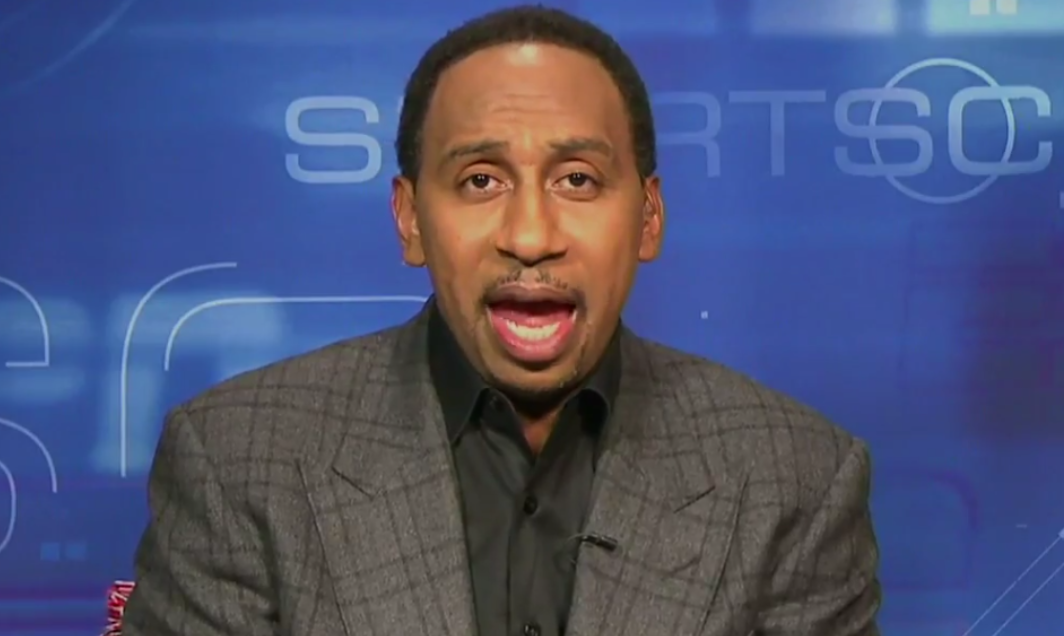In the midst of ESPN’s massive round of layoffs Wednesday, more than a few people brought up Stephen A. Smith as evidence of how the Worldwide Leader had gone astray. How, people wondered, could ESPN fire so many great reporters while keeping a loudmouth hot-take artist like Stephen A. Smith around to appear on First Take and numerous other shows?
Among the legions making some version of that argument was former Sports Illustrated writer and best-selling author Jeff Pearlman, who called Smith’s employment in the face of layoffs “an assault on the profession.”
On @stephenasmith, a $3.5 million contract and good @espn employees being canned left, right. Farewell, journalism … pic.twitter.com/jYyOYbD0aA
— Jeff Pearlman (@jeffpearlman) April 26, 2017
Well Stephen A. Smith puts up with a lot of crap, but he apparently wasn’t willing to put up with that. On his radio show Thursday, he addressed Pearlman’s criticism, as well as the general perception that he is unqualified for such a lofty position at ESPN.
The latest
I’m going to ask Mr. Jeff Pearlman and all the Jeff Pearlmans of the world a simple question: Why are you focusing on me? There are people in our business who actually get paid more, who do less and produce less. Why are you not talking about them?
…
Like when they call me ‘Screamin’ A?’ I’m the only dude on the air who’s loud? I know plenty of white dudes who are screaming and going off. They’re called passionate. I’m called loud. … The real issue at hand is, what you’re bringing into question are my qualifications.
Smith then listed out his career history, from graduating from Winston-Salem State University to holding numerous internships to working at several newspapers, including the Philadelphia Inquirer, where he was promoted again and again until he became on of the only black sports columnists in the country.
His point was simple: He worked hard to earn the position he’s currently in.
Some people will surely balk at Smith’s invocation of race, but he wasn’t really calling Pearlman racist or suggesting all criticism of him is due to his skin color (though undoubtedly some fraction of it is). This was his main idea:
I used to be a journalist? Mr. Pearlman, you used to be a college student. You used to be a high-school student. Last time I checked, there’s a level of elevation that took place because you graduate to certain levels. I’m not a blogger. I came up in this industry where you had to be a journalist. You had to break stories. You had to break news in order to elevate your career to get to a certain point to get to a certain level before you even had the license to give your opinion, especially if you were a black man.
Mr. Pearlman’s not black, maybe that’s why he doesn’t understand where I’m coming from. Maybe that’s why he’s so quick to talk about what I have deserved. I gave ya’ll my resume. I transferred from newspaper to television, from television to television and radio. I’ve done this. My credentials speak for themselves. I’m so sick and tired of people coming at me. If you want to talk credentials, name the time and place. Tell me what level I didn’t work on.
Smith repeatedly complimented Pearlman, saying he would never dare question another writer’s credentials.
Stephen A. is absolutely 100 percent correct that he has the resume for the position he’s in, that he worked his way up the ladder and earned bigger and bigger roles, and that it’s not easy to get to where he is now. Without question, his critics lose sight of that all the time, unfairly depicting him as a brainless carnival barker.
However, it’s certainly fair to wonder why Smith uses his hard-earned position to propagate a high-pitched, disagreement-centered, occasionally offensive model of television that risks undermining the more journalistic aspects of the industry—and to question why that’s the model ESPN chooses to reward.
